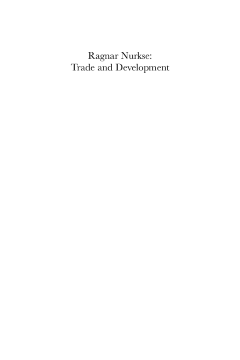
Additional Information
Book Details
Abstract
‘Ragnar Nurkse, Trade and Development’ is a timely reprint of Nurkse’s most important works, given the renewed interest in his writings amongst development economists, who are turning to this pioneering thinker in search for new inspiration. This volume aims to make his rarely published works available for an audience of economists, policy makers, researchers and students.
Ragnar Nurkse (1907-1959) was one of the most important pioneers of development economics, and although his writings have been neglected in recent decades, leading development economists and international organizations such the United Nations are now turning to Nurkse in search for new inspiration, due to the failure of neoclassical economics to adequately explain the experience of poor and developing countries. Until now, however, all Nurkse’s published works were out of print, and the most recent editions stem from the early 1960s.
‘Ragnar Nurkse, Trade and Development’ reprints Nukse’s most important works, making them widely available for an audience of economists, policy makers, researchers and students. The works reprinted here include two essays never printed before in this format: ‘Growth in Underdeveloped Countries’, (1952) and ‘International Trade Theory and Development Policy’ (1957), as well as the collected essays from ‘Equilibrium and Growth in the World Economy’ (1961), and the monograph ‘Problems of Capital Formation in Underdeveloped Countries’ (1953).
Rainer Kattel is Professor of Innovation Policy and Technology Governance, Tallinn University of Technology, Estonia.
Jan A. Kregel is Senior Scholar at The Levy Economics Institute of Bard College; the Center for Full Employment and Price Stability at the University of Missouri, Kansas City; and the Tallinn University of Technology.
Erik S. Reinert is Chairman of The Other Canon Foundation, Norway, and Professor at Tallinn University of Technology.
